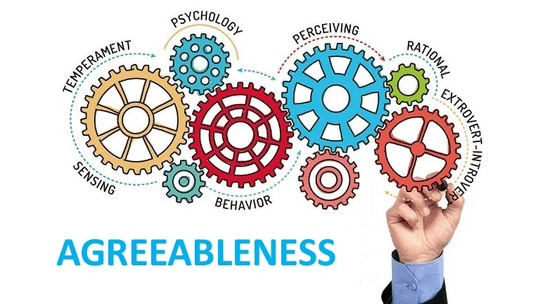Agreeableness

Agreeableness is a personality trait that describes a person’s ability to put others needs before their own. Those who are more agreeable are more likely to be empathetic and find pleasure in helping others and working with people who need more help.
The term “agreeableness” is commonly used to describe the level of friendliness, kindness and even politeness a person displays. Agreeable people are generally well-liked and prefer cooperation over conflict, have an ability to maintain relationships.
Agreeableness is one of five dimensions of personality described as the Big Five. The other traits are openness to experience, conscientiousness, extraversion, and neuroticism.
High Agreeableness
- Has a great deal of interest in other people
- Cares about others
- Feels empathy and concern for other people
- Enjoys contributing to the happiness of other people
- Assists others who are in need of help
- Tends to have a wide circle of friends
Low Agreeableness
- Takes little interest in others and other people’s problems
- Doesn’t care much about how other people feel
- Insults and belittles others
- May manipulate others to get what they want
- May have trouble keeping their cool in an aggravating situation
Facets of Agreeableness
Altruism (feel good when they are helping others; get tremendous internal rewards for doing good deeds and do not view it as self-sacrificing)
Cooperation (undertake efforts to avoid confrontations with other people; like to be seen as peacemakers, but will often compromise their own needs and interests to get along with other people)
Modesty (down-to-earth and rarely claim to be better than others)
Straightforwardness (tend to be straightforward and sincere; rarely feel the need to manipulate people to get what they want)
Sympathy (often very sympathetic and are easily moved to have care and concern for others; emotionally intelligent and very empathetic, often relating to the pain and suffering of other people)
Trust (prone to assume that other people have good intentions and mean well; can be slow to make judgments about other people and often care for people unconditionally)
Agreeable People:
Have strong interpersonal skills
They establish friendships in a short space of time and then successfully maintain these friendships. Highly agreeable people like cooperation and rarely going to fall out with someone over trivial matters. This provides stability in the workplace.
Are great teamworkers and are liked by coworkers
They are able to be at the service of others when there is an issue or when something needs completing is better served by a highly agreeable person. One of the other aspects of this trait is that co-workers like such persons for a variety of reasons and not just for pure altruism.
Have high resilience
Highly agreeable personalities are also highly resilient. They will find ways to get jobs completed because they are putting the needs of others first. This needs to be managed where someone can end up picking up all the slack on a project because of other individuals not pulling their weight.
Whilst being agreeable is widely considered to be a good thing, it can lead to its own unique issues. Being too agreeable can make taking criticism quite difficult, asserting yourself or making tough decisions can also be problematic in the course of your professional and personal life. One of the main concerns with overly agreeable people is that they struggle to progress in their professional careers because they are too concerned with others progressing, placing themselves in the background of what could be a positive step forwards. Agreeable people, for example, may find it very difficult to work alone, analyze the validity of arguments, make difficult decisions, or give bad news.
Can People Become More or Less Agreeable?

The degree to which a person presents particular traits does depend upon innate personality, but it also depends a great deal upon circumstances.
Even the most agreeable person may become less agreeable when faced with direct competition for critical resources or important opportunities.
On the other hand, research suggests that it is possible to increase agreeableness through:
- Exposure to positive role models who demonstrate highly agreeable qualities
- Being in situations where agreeableness is important (such as in a job which involves collaboration)
- Easy access to opportunities to behave in an altruistic manner
It may not be surprising that very young children are, in general, more self-centered and less agreeable than adults. It may be that adults’ experience with the ups and downs of life make them more empathetic to others’ pain. It may also be that ethical or religious education has a significant impact on agreeableness. A third explanation may be that we learn, over time, that most people are more likely to accede to our requests if we first build a trusting relationship.
Assess
the Agreeableness Level
of Your Target Audience
and other important personality traits

